Where Does Collagen Come From? Why The Source Matters?
- By Yonboon Team
- November-7-2023
You have heard a lot about collagen supplements, but have you ever wondered where do they come from? What’s the source? How are they made?
Commonly, there are two major sources of collagen products—marine (fish) and bovine (cow). Let’s discuss everything in detail, how the peptides are sourced and why the source matters?
How The Human Body Produces Collagen Naturally?
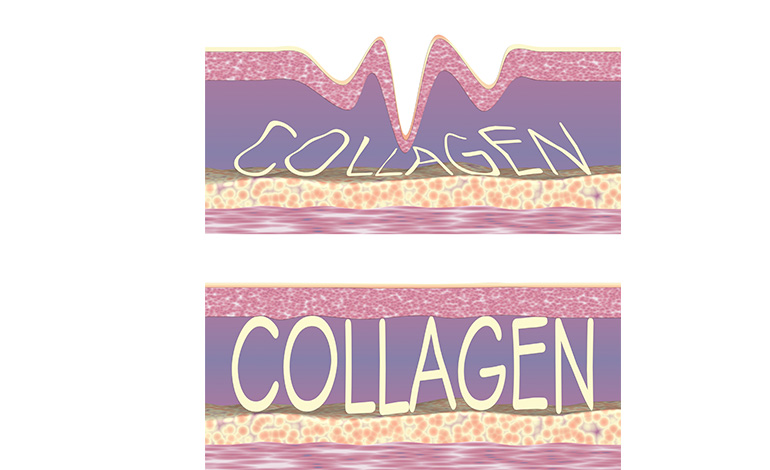
Here’s how our body produces collagen:
First, the process starts with amino acid synthesis (glycine, proline and hydroxyproline). These amino acids are essential for building the structure of collagen.
As the powerhouse for all the information, DNA sends instructions to fibroblasts (specialized cells) for collagen synthesis.
Certain enzymes, such as prolyl 4-hydroxylases, help in the conversion of amino acids into procollagen. Procollagen is a precursor and consists of 3 protein chains.
This procollagen is secreted into the extracellular matrix and is transformed into mature collagen to be used by the body.
Skin Collagen and Aging
Collagen consists of 70 percent dry skin mass. It supports your skin and enhances its hydration and plumpness. One thing to note here is that collagen fibers act as the foundation for hyaluronic acid and elastin, which play an important role in skin hydration and elasticity.
With aging, your body slows down the process of collagen synthesis. This leads to the skin getting thinner, weaker and drier. And you will begin to see wrinkles and fine lines. That’s why you need to replenish your body with collagen.
It’s worth noting that the benefits you see with collagen intake will be visible till the time period you take the supplements. If you stop supplying your body with collagen, the effects may disappear.
Read also: What Does Collagen Do for Your Skin?
What Are the Different Sources of Collagen?
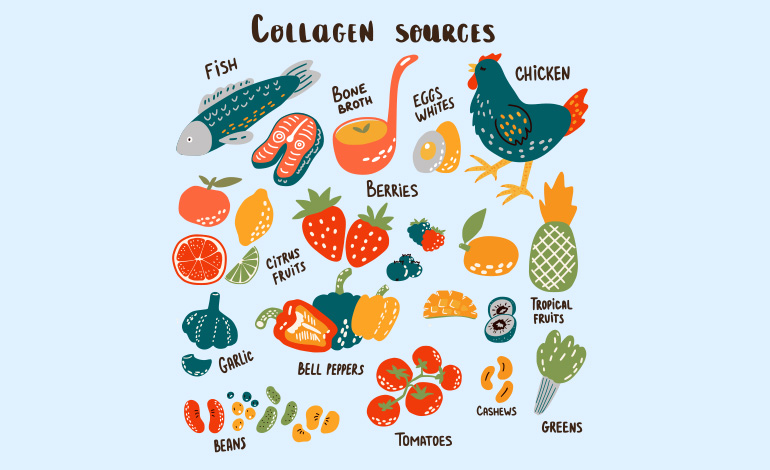
1- Marine Collagen
Marine collagen is sourced from the scales, bones and skin of fish. It is marine collagen is highly bioavailable and the purest form of collagen. When it comes to sourcing our marine collagen, we follow sustainable and eco-friendly procedures. Our marine collagen is hydrolyzed and sourced from fish scales and is rich in type I collagen.
Related: Why Marine Collagen is Better?
2- Bovine Collagen
Bovine collagen is derived from cows, especially bones, hides, and tendons. It is rich in type I and type II collagen.
3- Porcine Collagen
As the name indicates, this collagen is sourced from pigs (by boiling pig skin and bones). However, it raises many ethical concerns, especially for Muslims.
Read also: What Type of Collagen Is Best? A Guide to Optimal Wellness
What Foods Are Rich in Collagen
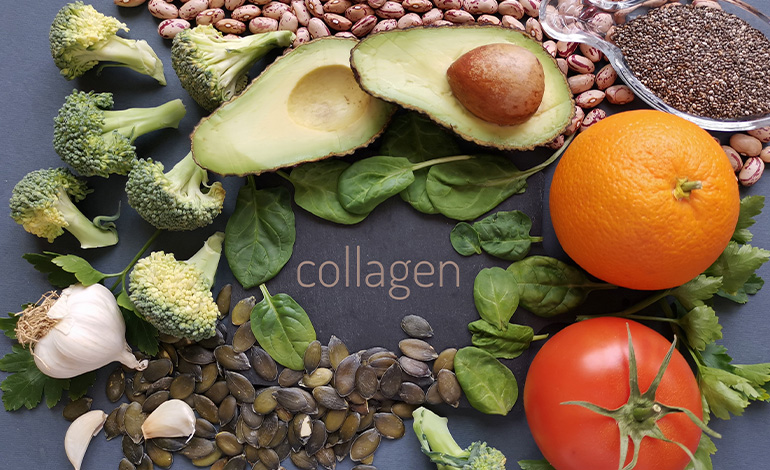
There are many collagen-rich foods that contain high protein content. These include fish, chicken, beef, dairy, eggs, and beans. Other nutrients such as zinc, vitamin C and copper also play an important part in collagen production in your body.
To keep the levels of zinc and copper balanced in your body, you should include nuts, shellfish, and whole grains in your diet. Similarly, you can get Vitamin C from tomatoes, citrus fruits and green vegetables.
Also, there are many good sources of proteins that build collagen in your body, such as bone broth and red meat.
So, Why the Source Matters?
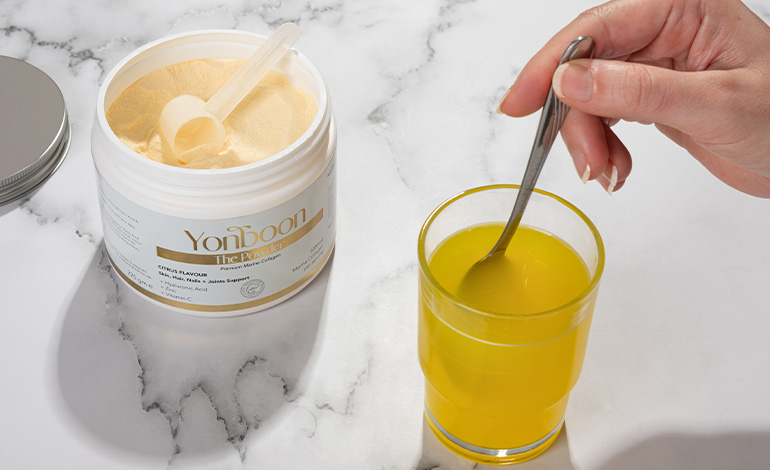
When it comes to collagen supplements, knowing the source matters a lot. Different sources (marine, bovine, porcine) offer various benefits for skin, hair, nail and joint support.
The purest and most effective collagen supplements are marine collagen products as they are highly bioavailable and hydrolyzed than other sources. Moreover, there are fewer ethical concerns and dietary limitations for marine collagen.
So, it is advisable to choose the right type of collagen for your individual preferences and goals.
Collagen Supplements and The Ethical Concern
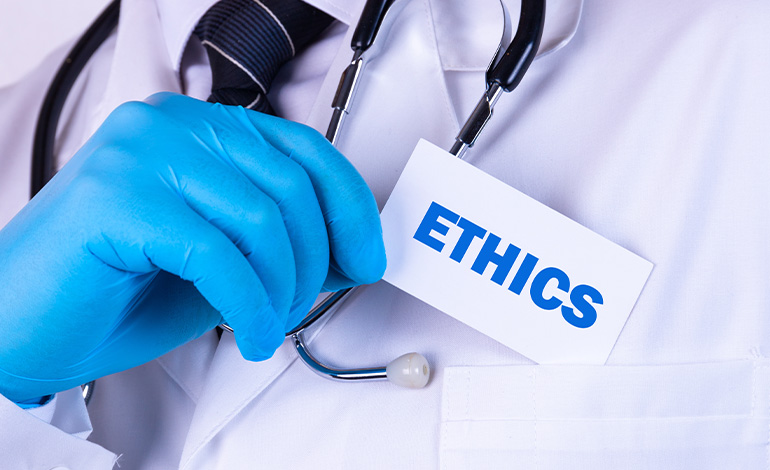
As collagen offers amazing health and beauty benefits, there might be some ethical concerns related to the sourcing. We know that collagen is one of the byproducts of animals and this has raised concerns related to animal welfare and sustainability.
As mentioned earlier, our marine collagen supplements are sources from fish skin and scales and are considered ethically right. Why? Our supplements are made of fish byproducts that would otherwise go to waste.
So, with Yonboon marine collagen supplements, you get complete peace of mind that you are choosing sustainable and eco-friendly options.
Read also: How to Get the Best Out of Your Collagen Supplement?
FAQs
What are collagen peptides?
Collagen peptides are tiny pieces of animal collagen. Collagen is one of the proteins that make up our bones, skin and cartilage. These peptides are produced by breaking down whole collagen protein into smaller pieces. When taken orally, collagen peptides help in building skin cells and cartilage. This can enhance skin conditions, joint support and overall health.
What are the different types of collagen, and where are they commonly found?
There are five common types of collagen such as:
- Type I: Type I collagen makes up almost 90 percent of body’s collagen. It is highly packed and used to provide strength and structure to your bones, skin and ligaments.
- Type II: This type of collagen is found in elastic cartilage that is meant for joint support.
- Type III: Type III collagen is found in arteries, organs and muscles.
- Type IV: This type of collagen is found in the layers of your skin
- Type V: Type V collagen is found in a few layers of your skin as well as placental tissues, cornea of your eyes, and hair.
Are there any side effects or allergies associated with collagen supplements?
There can be a few side effects or allergies associated with collagen products. These side effects are often visible if you have taken an excessive amount of collagen supplements. Also, there may be mild symptoms and allergies associated with abnormal consumption of collagen. These include acne breakouts, rashes or general skin inflammation.
Are there any scientific studies supporting the claims about collagen's health benefits?
Yes. There are many scientific studies that show collagen supplements can enhance joint and skin health. However, more research is required to know the effective dosage of collagen supplements for better results.
Can collagen supplements help with specific skin conditions like wrinkles and acne?
Absolutely yes. Oral collagen supplements increase the moisture content of skin leading to more hydration. This enhances the elasticity of skin and ultimately reduces the chances of rough skin and wrinkles.
How long does it typically take to see noticeable improvements in health or skin after starting collagen supplementation?
Usually, after 4 to 12 weeks of taking collagen supplements regularly, you can see noticeable improvements in your overall health and skin conditions. For better joint support and muscle strength, consider using the supplements for prolonged periods of time.
What happens to collagen as I age?
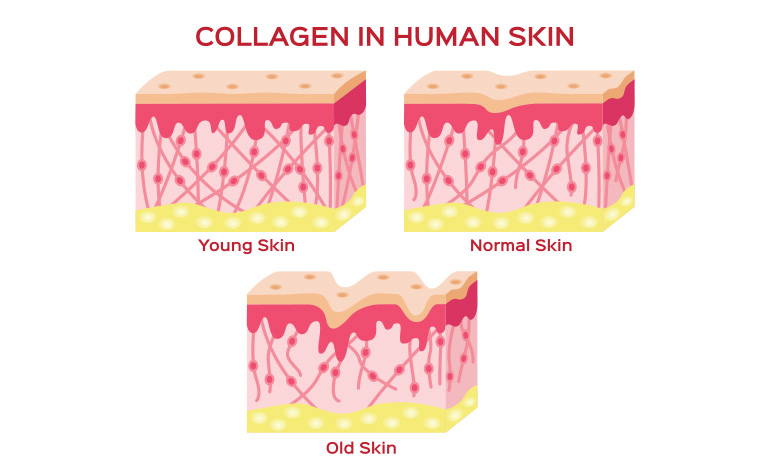
As you age, the collagen levels in your body start to decrease. And this loss of collagen can affect the way you look and feel. You can experience loss of natural fullness, dry and droopy skin, joint discomfort, weak muscles and more. While these signs and symptoms are minimal at first, they can jumble up as you keep aging. That’s why it is advisable to start taking collagen supplements in your late 20’s.
What lifestyle habits damage collagen?
There are certain habits and factors that result in collagen damage in your skin or body such as:
- Exposure to sun and UV rays
- Lack of enough sleep
- Unbalanced diet
- Lack of vitamin C
- Not taking collagen supplements at the right time
What diseases and other factors damage collagen?
Other than factors like UV rays, unhealthy diet and laborious routine, there are certain diseases that can affect the production of collagen in your body. These include scleroderma (hardening and contraction of skin), rheumatoid arthritis (inflammation of joints and bones) and lupus (an autoimmune disease). These conditions mostly affect people in their 30s and 40s.
What can I do to improve skin collagen loss to slow the signs of aging?
You can improve the collagen levels in your skin by consuming foods that are rich in antioxidants, vitamin C and other nutrients. You should also avoid smoking, going bare face in the sun and taking in a lot of caffeine. One thing more—start taking collagen supplements daily to slow down the signs of aging.
What does the research say about the effectiveness of collagen supplements?
There are many scientific studies and clinical analyses stating the effectiveness of collagen products. The studies indicate that people who introduced regular collagen intake to their daily routine observe improvements in skin (less wrinkles, more suppleness and more hydration). Not only that, but they also saw a great deal of improvement in hair health, joint support and overall health.
What’s The Final Verdict?
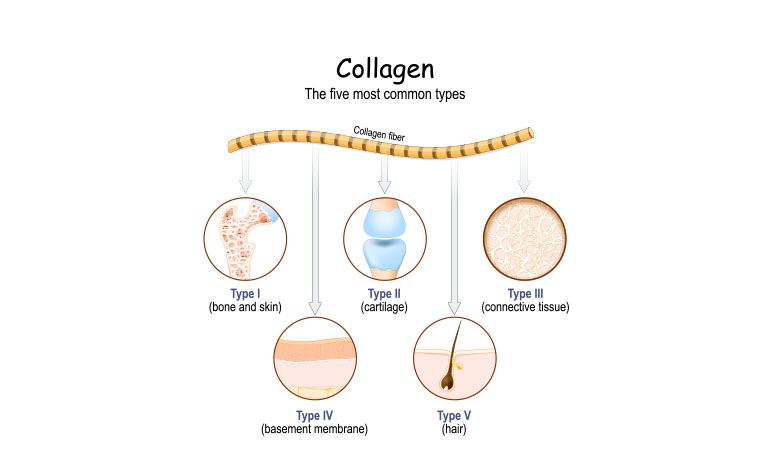
With the above discussion, we can safely say that marine collagen supplements are the best form of introducing collagen to your body. At Yonboon, we offer collagen powder, collagen shots and blends.
If you aren’t sure what type of collagen supplement will work best for you, you can take our quick quiz here. And here’s a catch—you can get 20% on our premium products by taking the quiz.





